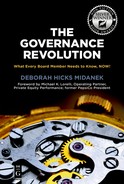Prologue: What Is the Governance Revolution?
It is of the essence of revolutions of the more silent sort that they are unrecognized until they are far advanced. This was the case with the so-called Industrial revolution, and is the case with the corporate revolution through which we are at present passing. The translation of perhaps two-thirds of the industrial wealth of the country from individual ownership to ownership by the large, publicly financed corporations vitally changes the lives of property owners, the lives of workers, and the methods of property tenure. The divorce of ownership from control consequent on that process almost necessarily involves a new form of economic organization of society. Manifestly the problem calls for a series of appraisals.
—Berle & Means: The Modern Corporation and Private Property, 1932
In 1932, Adolf A. Berle and Gardiner C. Means named a revolution, the corporate revolution, that, following the industrial revolution before it, transferred considerable control of wealth to the organization. Today we face continuing battles for control of the organization and the wealth it provides, and it is the clearly the responsibility of its guardians, the board of directors, to protect that wealth and the future direction of the corporation. We are, therefore, in the midst of a third revolution: the governance revolution.
Directors of the public corporation enter this revolution poorly armed. Their job, not well understood by many, including directors themselves, is not to maximize shareholder value. They are there to protect and enhance the health and value of the corporation as the guardians of its perpetual life. Focus on maximizing shareholder value in the short run, recently a dominant focus, can be seen as a dereliction of the director’s fiduciary duty. Each director singly, and the board of directors collectively, owes its loyalty to the corporation, not to its shareholders’ short-term wishes.
Shareholders of public companies do not own them, but instead own interests in residual income with specific and narrow rights attached, including the right collectively to elect the directors. Just because they assert rights does not mean they have those rights, unless the board falls for their bluster and gives them rights.
Shareholder activists may employ very smart people, and may have ideas worth listening to and acting upon. That does not give them the right to abuse and harangue sitting directors, or do anything more than vote them out, fair and square. Companies also employ and can hire very smart people to analyze alternative scenarios just as the activists do, and implement those they find to be in the best interests of the corporation, with assistance from their boards.
Much short-term pressure in the markets today derives from the need of pension fund managers to realize returns above public market norms. As hard working pension fund managers seeking to garner enough money to pay escalating, unfunded pension obligations, they have been increasingly investing in alternative asset classes such as hedge funds and private equity vehicles whose returns are alleged not to correspond with broad market behavior. Addressing the pension crisis would change the investment landscape and significantly ease the chronic pressure for short-term profits.
For their part, if directors take ownership of their true roles, they can drive the companies in their charge toward long-term sustainable value creation over short-term sophistry. They can just say no to activists, and can boldly lead their companies to better futures if they will do the job before them. By building an understanding of the origins and legal basis for their role, these directors will arm themselves to prevail in the governance revolution.
The role to be played by the board of directors has never been more critical to our nation’s prosperity. Much work needs to be done. Now is the time.
